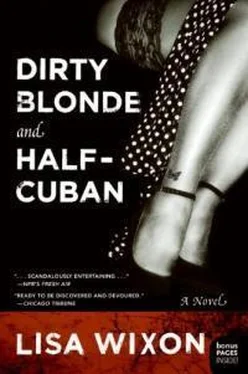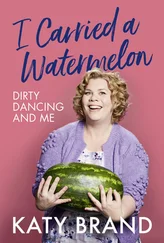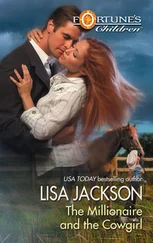Lisa Wixon - Dirty Blonde and Half-Cuban
Здесь есть возможность читать онлайн «Lisa Wixon - Dirty Blonde and Half-Cuban» весь текст электронной книги совершенно бесплатно (целиком полную версию без сокращений). В некоторых случаях можно слушать аудио, скачать через торрент в формате fb2 и присутствует краткое содержание. Жанр: Современная проза, на английском языке. Описание произведения, (предисловие) а так же отзывы посетителей доступны на портале библиотеки ЛибКат.
- Название:Dirty Blonde and Half-Cuban
- Автор:
- Жанр:
- Год:неизвестен
- ISBN:нет данных
- Рейтинг книги:4 / 5. Голосов: 1
-
Избранное:Добавить в избранное
- Отзывы:
-
Ваша оценка:
- 80
- 1
- 2
- 3
- 4
- 5
Dirty Blonde and Half-Cuban: краткое содержание, описание и аннотация
Предлагаем к чтению аннотацию, описание, краткое содержание или предисловие (зависит от того, что написал сам автор книги «Dirty Blonde and Half-Cuban»). Если вы не нашли необходимую информацию о книге — напишите в комментариях, мы постараемся отыскать её.
Dirty Blonde and Half-Cuban — читать онлайн бесплатно полную книгу (весь текст) целиком
Ниже представлен текст книги, разбитый по страницам. Система сохранения места последней прочитанной страницы, позволяет с удобством читать онлайн бесплатно книгу «Dirty Blonde and Half-Cuban», без необходимости каждый раз заново искать на чём Вы остановились. Поставьте закладку, и сможете в любой момент перейти на страницу, на которой закончили чтение.
Интервал:
Закладка:
She sucked in her breath. The garden overlooked Havana Bay, lit by the warm, golden light from El Morro castle and the rotating brightness of the potent lighthouse on the cliff.
On this evening, she wondered how a woman in her prime, in a country that inspired poets with its air and mystical beauty, could find herself alone and unwanted by the man she’d loved most. Or how her life had become narrow and full of a yearning so palpable that it lived like a third person in their home.
But my mother knew that the Hotel Nacional on New Year’s Eve held a historical precedent for change. Batista, she remembered reading, had spent his last minutes as Cuba’s president at this very hotel, on this very night nineteen years before.
She was thinking this when she felt a hand under her elbow. Without looking up, she knew who it was, and knew she’d succumb to the Cuban at last.
My mother felt her back arch and her arms elongate and her gown flutter behind her as she dove headlong into the Havana Bay, receiving the warmth and the gold and the light. It was José Martí’s words that preceded her supernal fall, in verses spoken by José Antonio, the man who would alter the course of many lives:
Todo es hermoso y constante,
Todo es música y razón,
Y todo, como el diamante,
Antes que luz es carbon.
All is beautiful and right,
All is music and reason,
And, like the diamond, everything
Is coal before it’s light.
30
I n outstretched armsLimón holds furry brown chunks away from his six-pack stomach. Jesús, a dreadlocked Dominican who could easily be his twin, is egging Limón on.
“Drop the damned coconut already!” demands Jesús.
“Obí,” says Limón, closing his eyes and summoning the coconut oracle. “Obí, tell us, is Alysia’s father alive and living in Havana?”
He releases the fruit chunks and opens his eyes. All four pieces have landed rind-up. Limón pounds the wall and looks at me sheepishly.
“We need an expert,” he says. “We’ll have to ask my priest. I’ve no idea what rind-up means.”
“A Magic 8-Ball could tell us,” I quip.
No matter how often I tell Limón I don’t buy his religious practice, Santería, or his trust in orishas—gods representing human attributes, a theanthropism similar to the practice of ancient Greeks—he’s convinced his beliefs will provide clues to finding my father.
Limón’s faith didn’t help him in an earlier scouting of my old neighborhood. The mission was a bust. No one remembered a family of American diplomats living there two decades before. Limón did, however, confirm a figure-eight swimming pool next door to my supposed childhood home—a tidbit that matches the description in my mother’s diaries.
“We Santeros communicate with ancestors,” Limón says solemnly. “Isn’t that what you want?”
I nod. Limón has been pestering me to visit his priest, and I agree to visit him. It can’t hurt, I figure.
“We’re not going anywhere until the tour,” says Jesús, who’s eager to begin our day, this crisp and bright December.
Limón scoops up the fruit shells and chews on the white meat while we scoot through Old Havana in search of a peso taxi. Limón confides later that Jesús, who approached him on the street, paid $3,000 for Limón’s identity carnet.Jesús is spending a few weeks in Havana picking up enough Cuban slang and geography to fake his way through Krome Detention Center, where Cubans in Florida are processed before being handed a green card, with residency all but guaranteed after a year. Cubans are the only immigrants automatically granted this privilege in the United States. Mexicans, Europeans, and Asians must all fight their way through the bureaucracy in order to have a shot at becoming American residents.
Jesús, however, has found a loophole. He’ll use his Dominican passport to enter Florida on a temporary farmworker’s visa. While in Miami, he and other friends who’ve bought Cuban identities will dump their real passports and swim along shallow shores off Key Biscayne, claiming they are Cuban rafters who’ve just floated in. Their purchased Cuban carnetswill be offered to immigration as proof. I tell Limón it’s an outrageous scheme, but he just shrugs and says it’s more common than I’d think.
“West Africans, Venezuelans, and Spaniards,” he says. “Some you see here are probably scouting for a look-alike Cuban’s ID. Works, too. I just show up at the police station, claim mine’s been stolen, and get another one. No problem.”
In Cuba, there are few stores, and fewer still that advertise with a shingle or an awning or fluorescent lights. Yet everything is for sale, and anything may be purchased at any time—in the middle of the night, on holidays, during a category-five hurricane.
It’s called the black market, but it is ineptly named, as black implies dark—and thus evil or sinister—and here it does not assume a morality. If all colors, when swirled together, make gray, then it’s the true color of Cuba’s market. Because everything from lottery tickets to laundry soap to a twelve-year-old’s virginity can be had. All it takes is a whisper in the ear of a jinetero,or a mechanic, or a retired schoolteacher, and enough greenbacks to make it happen. And happen it does.
AT THE INTERNET café, I make my written apologies to Susie and my friends, explaining away my tardiness with the excuse that a few minutes of e-mail access cost as much as a week’s worth of taxis. Susie writes that she’s worried about me, and doesn’t seem to buy into my chipper inventions of my life here in Havana. She wants to know what I do with my days. I tell her about the movies and, today, regale her with stories of the dreadful chore of clothes shopping.
Anatole France wrote this: “Show me the clothes of a country and I can write its history.” Perhaps the recent history of Cuba can be summed up by the women’s-wear store near my home. In a shop window, only sizeable, polyester underwear is on display, and the unmentionables hang suspended on fishing line. The sign above reads: No compre de prisa,Don’t buy in a hurry. It’s this nonsensical reflection of the Cuban economy that forces me to shake my head. And as I do so, I’m stared at funnily, and the look is likely to come from a sexy, haughty beauty, swaying down the street in tight, sheer white pants with big, old-lady underwear bunched up underneath.
Cubanaspossess a raw beauty, but without the sophistication and refinement that could be gleaned from a few copies of Spanish Elle.
I’m hoping these tidbits keep Susie’s worry at bay. What I don’t tell her is how I awaken each day hoping it will bring a visit from Victor, and the address of José Antonio.
Lying to her is the worst of it all.
“DON’T YOU WANT to say hola?” asks Limón, pointing to a middle-aged foreign man holding the hand of a teen cubana.
“No way in hell,” I say, shaking my head and crouching in the cavernous backseat of the 1956 Ford Fairlane we’ve hired with a driver for the day. The floorboards reek of gas.
We watch the couple. Daya sports a bored expression, and Richard is so amped he’s practically dragging her by the hand.
“Who has more fun, people or monkeys?” jokes Limón, quoting another of my grandfather’s sayings and tapping on the window.
“We’ve got time to stop if you want to say qué bolá,” says Jesús, jumping in the backseat with a bottle of rum and a $10 marijuana cigarette that, as he soon discovers, is—quite literally—grass.
“Forget it. Vamos.Those two are like peanut butter and jelly,” I reply, watching the couple fade into a crowd. “Fine together but after a few bites so messy and sticky and you need something strong to wash ’em down.”
Читать дальшеИнтервал:
Закладка:
Похожие книги на «Dirty Blonde and Half-Cuban»
Представляем Вашему вниманию похожие книги на «Dirty Blonde and Half-Cuban» списком для выбора. Мы отобрали схожую по названию и смыслу литературу в надежде предоставить читателям больше вариантов отыскать новые, интересные, ещё непрочитанные произведения.
Обсуждение, отзывы о книге «Dirty Blonde and Half-Cuban» и просто собственные мнения читателей. Оставьте ваши комментарии, напишите, что Вы думаете о произведении, его смысле или главных героях. Укажите что конкретно понравилось, а что нет, и почему Вы так считаете.












